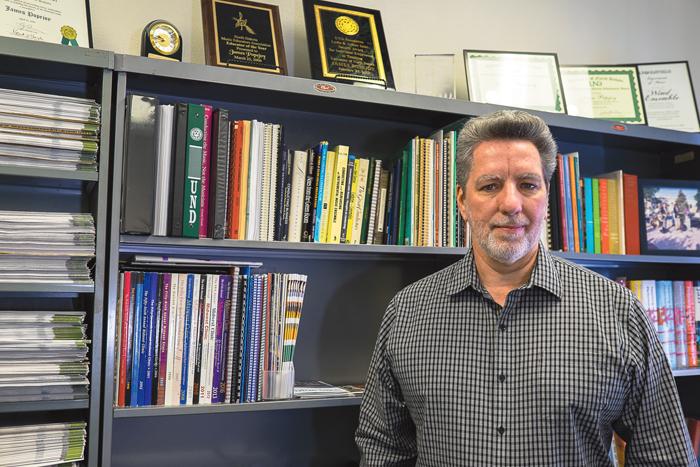Major of the Week
Music Education
Dakota Student / Nicholas Nelson
James Popejoy is a professor of music and the director of bands at UND.
February 10, 2017
It’s a field where one must cater to the group and the hundred individuals in it.
The music education major at UND has a close connection to the music performance major in both requirements and teaching style.
James Popejoy, the Director of Bands at UND, explained that students are taught and are taught to teach music through performance.
“If they’re doing their job correctly, a music educator should be teaching the students not just how to play the notes on the page, but also about the composers and about the time period and all the various factors that go into making music,” Popejoy said. “Hopefully, through the student’s personal experience of creating music, or re-creating music, that provides them an opportunity to grow and learn to love and appreciate music.”
Popejoy described music education as a full degree, what with the standard private instrument lessons, participation in multiple ensembles and taking music theory courses that music students already take.
Music education students also must take classes on how to teach each instrument, classroom management and how to structure their own programs.
There are no electives for this degree, which means there is no flexibility in requirements for this program. There are other classes offered to students, but they are not required for the degree.
“Students know that they, beyond the minimum requirements, need to be prepared to do the maximum to be successful,” Popejoy said.
To be a successful music educator, Popejoy said one must be able to adapt to many different types of people.
“A great teacher can share the same knowledge in multiple ways, knowing the students sitting in front of them learn in different ways,” Popejoy said.
This leads to another helpful trait: flexibility. He explained that if he were teaching until he was 80, he’d still be learning new ways to teach his students.
“No matter how long you teach, the people that you teach continue to evolve,” Popejoy said. “That’s part of education. Things that work with one group, don’t necessarily work with another group.”
A key characteristic that repeatedly came up during his interview was the element of motivation. With the long list of requirements and responsibilities a music education major takes on, one must have their eyes on the prize the entire time.
Popejoy said he decided he wanted to become a band director as early as the eighth grade. He is now teaching music for his 36th year.
However, some students try out the profession but later change their minds.
“Many music teachers don’t make it past the first two or three year,” Popejoy said. “They get started and [then] they decide it’s more work than they’re willing to put in or the effort to. I think if they get past the first three or four years, then they’re usually in it for life.”
Those who stick with goals of running their own band programs or becoming music educators will be welcomed with open arms from schools across the country. As of late, there has been extremely high demand for these careers.
Popejoy said the need for music educators is higher now than ever. He cites how many students isolate themselves on their phones; having little interaction with those around them, leading to a desperation for interaction which music offers.
Just in the last two years, he has received many phone calls from local Grand Forks public schools looking for music educators to fill positions.
Unfortunately, times like these do not last forever. When times are tough and funding is cut, many times it is the arts that receive the harshest cuts.
Popejoy said he has seen this trend before, but argues that teaching the arts are important to any education. He finds that other core subjects are important as well, but also said that it’s frustrating to continuously have to justify what they do.
“Is life really only about the very basic core subjects?” Popejoy said. “Is that really what makes someone a successful person or a happy person? We’re teaching them to be creative and we’re using music as a tool to do that or the arts in some way.”
For those who find the arts unneeded or under value its impact on a community, Popejoy sums up the art’s influence as such:
“Almost every society is defined by their culture. When societies go away, what’s left behind is their culture.”
Jacob Notermann is a staff writer for the Dakota Student. He can be reached at jacob.notermann@und.edu


